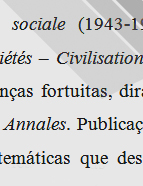

................................
Its aim was to encourage an update of the history being written and taught, as might be expected in the case of activities that were heavily conditioned by the government. This group was to some extent related to the Revista de Economia (1948-1964). Indeed, and in spite of everything, these intellectual breathing valves began to establish their path, triggering the arousal of renewed vocations and interests, in connection with the journal directed by Lucien Febvre at the time. Magalhães Godinho himself stated: "I consider myself attached to the "Annales" group, not only because I am one of its collaborators and one of the founders of the Association Marc Bloch [in Paris], but above all because it is held together by an anti-dogmatic attitude, based on scientific humanism". (Godinho, Ensaios III, p. 274).
This Modernity, even visible in Francoist Spain, of which historians such as Jordi Nadal (1929), Joan Reglá (1917-1973) and Josep Fontana (1931) are good examples, gathered in Barcelona at the Centre for International Historical Studies around Jaume Vicens Vives (1910-1960) - related to Febvre and Braudel and the Annales. According to Pierre Vilar, Vivens Vives was an undisputed master and untiring animator of studies (Annales, année 1954, vol. 9, no. 2, pp. 262-264). Among other works, he was also responsible for Aproximación a la historia de España (1952) and for directing Historia social y económica de España y América (1957-1959). And not only. In other Spanish centres, the same French influence was felt through Felipe Ruiz Martin (1915-2004), Valentín Vázquez de Prada (1925), Gonzalo Anes Álvarez (1931-2014) (direct disciples of Braudel in Paris) and Antonio Domínguez Ortiz (1909-2003), among others.
In Lisbon's Faculty of Arts, which followed the traditionalist and safe governmental path without any noticeable hesitations, much remained the same and appeared unlikely to change. However, and very slowly, some signs of modernization became evident: Virgínia Rau (degree in 1941, doctorate in 1946) was familiar with - but did not follow - the most complex and rich examples of the literature she had at her disposal. She was very well informed but did not appear to accompany the authors of these works in their research. In fact, while she quoted them with some frequency, she did not hold them up as an example or give the impression of being inspired by the problems and themes they raised.
